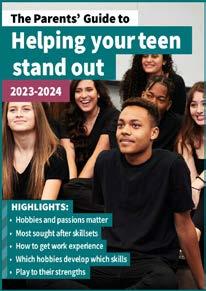
The Parents’ Guide to 2023-2024
HIGHLIGHTS:
• Why the basics aren’t basic
• Creating routines
• How to help them revise
• Managing exam nerves
• Setting them up for success



Homelife & Study sixth-form



KEEPING THEM HEALTHY

PROVIDING THE RIGHT HOMELIFE

HELPING THEM REVISE


PREPARING FOR EXAMINATIONS
MANAGING EXAM NERVES
Page 2 Page 3 www.theparentsguideto.co.uk
The Parents’ Guide to Homelife & Study - sixth-form
Contents


Introduction
Sixth form is a big step in a teenager’s development, bridging the transition from child to adult, as your teen works toward qualifications which will affect what they do in the future. This is an ideal time for you to help them consolidate good habits that will set them up for adulthood, both in terms of lifestyle (eating the right foods, being active, building resilience) and in their approach to study (helping them discover which ways of learning suit them best).
Schools and colleges actively encourage independent study to help prepare students for further education or the workplace, where they will be expected to take a more proactive approach to finding out information for themselves. This means they’ll have more unsupervised study time, so they might need help in balancing work and play: understanding why it’s important not to waste study periods during the day, especially at the expense of working late into the night.
You’ll want them to do well in exams and effective revision plays a crucial role. Whilst you can’t revise for your child, there are lots of ways you can help them. This ranges from checking what they know and helping them remember things, to providing the right homelife so that they can be at their most alert, healthy and resilient.
Effective revision also includes developing and growing essential life skills, such as good time management; the ability to deal with situations when things go wrong; and finding the right balance between work and play. These are areas where you have lots of experience and can help them develop systems that work best for them.
The Parents’ Guide to Homelife and study shows you how to support your teen in making study and revision time as productive as possible. We’ve included plenty of tips on creating a homelife that encourages success and helps them flourish, as well as on guiding them towards living a balanced lifestyle. We’ve mostly focused on long-term support, but there are also some pointers on how you can help just ahead of examinations when the pressure is especially intense.
Stay up-to-date on ways to support your teen with our fortnightly newsletter
Sign up here
Page 4 Page 5 www.theparentsguideto.co.uk
US
Guide to Homelife & Study - sixth-form
JOIN
The Parents’


Page 6 Page 7
Keeping them healthy The Parents’ Guide to Homelife & Study - sixth-form
www.theparentsguideto.co.uk

Sleep
Sleep is essential for good health, so make sure your teen is getting enough rest. Without enough sleep, your teen will struggle. Some symptoms include tiredness, irritability, lack of concentration, poor diet (not wanting to eat, or eating too many of the wrong things) and they’re less likely to exercise. All of which will poorly influence how they feel and how well they cope with school life and life in general.
TEENAGERS NEED ABOUT EIGHT HOURS OF SLEEP EACH NIGHT
Many teens don’t get enough sleep – either because they’re revising into the small hours or more interesting temptations (such as box sets and social media) encourage them to stay awake. Being in bed doesn’t count as being asleep! Teens need a lot of sleep – somewhere between eight and ten hours each night - given the huge changes taking place in their bodies. To make sure they’re getting enough, work backwards. If they have to get up at 7.00am, then they need to be asleep by 11.00pm latest – which probably means heading to bed much earlier.

A bedtime routine
Creating a “bedtime” routine, such as switching the phone to silent, putting it away, taking a bath, having a hot drink and dimming the lights can all help calm the mind and prepare it for sleep. Sticking to a similar routine every night signals to the body that it is time for bed and helps it switch off, so try to get your teen into the habit of doing the same things before bed and going to sleep at a similar time (especially on week nights, but even at the weekend too).
A little calm time before bed means avoiding stimulation. Studies should be packed away, no exciting films or video games, no high tempo music or bright lights.
If they’re prone to worrying, keeping a notebook where any niggling thoughts or important things to do the next day can be jotted down. This will help stop them worrying about forgetting things and can help prevent the mind turning over once the lights go out.
Mobiles, screens and sleep
Getting enough sleep can be severely impaired by your teen’s ready access to a 24/7 online community via social media, not to mention their compulsion to play games and catch up with box sets late into the night.
By the time they’re in sixth form, it’s harder for you to insist on behaviours (such as phones off) that you may have been able to do when they were younger. Try to have conversations with your teen about using mobiles sensibly, at times when neither of you are tired or emotional, to avoid heated discussions or rows. This way you’re much more likely to reach a compromise that suits you both.

Page 8 Page 9 www.theparentsguideto.co.uk
them healthy Sleep
Keeping

Encourage good habits
At least 30 mins screen-free time before settling down to sleep is always a good idea. It doesn’t mean doing nothing – they could listen to audio books, podcasts or relaxing music, where the phone is closed (so no glare or visual stimulation) and they can enjoy listening to something relaxing as they drift off to sleep. There are timers too, so they don’t need to fret that if they do fall asleep, their phone will be running all night.
Set phones to bedtime mode during sleeping hours so that they’re not distracted by the tempting ping of alerts and messages – which they feel they must immediately view. Encourage them to use the “Do not disturb” feature if their phone has one, which will automatically silence incoming calls and messages at the same time each night (they can make exceptions for emergency numbers) and use the phone’s night screen settings to reduces glare throughout the evening (white light on bright screens prevents sleepiness). Establishing good phone habits now will benefit them hugely later in life too.
Avoid lie-ins
At the other end of the day, try to set a routine so they get up at a similar time each morning and, hard though it may be, try to limit lie-ins at the weekend. Long lie-ins disrupt their sleeping rhythm, making it harder for them to go to sleep
at an appropriate time on Sunday night and consequently, making it harder for them to wake up on time on Monday mornings. Where possible, bedtimes and get-up times should be similar from one day to the next allowing the body to synch to a regular cycle. Make plans for weekend mornings so they have a reason to get up.
Walk your talk!
Are you setting a good example? The older your child gets, the harder it is for you to insist on what they do, but you can encourage them by being a great role model. It might be harder for them to get into good sleep routines if they see you are not following the advice you give them.

Page 10 Page 11 www.theparentsguideto.co.uk
Sleep
UK USEFUL
Keeping them healthy Sleep
NHS Live well
council
LINKS

Diet and nutrition
Food is fuel for the body, so making sure they eat at regular intervals with plenty of healthy ingredients is vital. Try to ensure they have a healthy breakfast before leaving the house (even if it is only cereal), provide a packed lunch and a nutritious supper in the evening.
A balanced diet
As well as their “five a day” (about a third of the overall diet), everyone should have some starchy carbohydrate (another third), and the remaining third split between protein and milk/dairy with a small amount of fat . Ensure vegetarians and vegans are getting enough protein with plenty of protein rich vegetables (such as peas, sprouts, sweetcorn, asparagus, broccoli and avocado) as well as nuts, pulses and beans.
Good food choices to maximise concentration include green leafy vegetables, herbs, oily fish and pulses so try to include these as a regular part of their diet – it will be good for the whole family too!
USEFUL LINKS
Eating regularly
It’s important that teenagers eat at regular intervals to avoid peaks and troughs in energy levels. Breakfast, lunch and dinner should be punctuated with healthy snacks. Providing a packed lunch and snacks for them when they are on the go can help ensure they are eating the right types of food.
If possible, sit down for a family meal together at the end of each day (mobile and tablet free!). Not only will this start a fantastic lifestyle habit for them to take through to adulthood, it will also provide a break from being online and a chance to chat and share one another’s experiences that day.

Cook together
This provides a very good opportunity to spend time together and bond with your teen. It’s a non-pressurized space for them to talk to you about things that may be troubling them without making it the central focus – you can catch up on good news too. It gives you a chance to show them how to cook well-balanced food and gives them life skills to take when they leave home (whether that’s to go to work or go on to further education). It also means that, with enough practise, they’ll be able to create a family dinner so the pressure isn’t all on you to feed the family.
KEEP THE HOUSE STOCKED WITH PLENTY OF HEALTHY SNACKS
Snacking
The temptation to eat sugary, highly salted, unhealthy snacks to keep energy levels up is not only bad for overall health but can negatively impair their performance and ability to concentrate. Help them make the right choices when they are in a hurry by providing them with healthy alternatives. If chocolate is a must, swap milk chocolate or chocolate bars for dark chocolate. This doesn’t mean they can’t have an occasional treat, but it’s better to avoid eating high sugar and salty foods too often.

Page 12 Page 13 www.theparentsguideto.co.uk
NHS Eatwell
BBC Good Food
Guide
Keeping them healthy Diet and nutrition
Growing up
As your teen gets older and more independent, they’ll start preparing their own food and it’s not possible for you to watch what they’re eating every meal time. Remember, they are going to eat what you have available in the house, so if your fridge, freezer and cupboards are full of good options, that’s what they’ll reach for when they’re hungry.
When they’re eating away from home (for example at school) try to provide food, rather than money, so they’re not tempted to spend on unhealthy favourites.
Fast food, sweets, crisps and other treats are absolutely fine, so long as they are a small part of an overall diet and not the staple foods. However, tired teenagers are often tempted by convenience and “quick fix” energy boosts so may be drawn towards unhealthy options despite your best efforts to encourage them otherwise.
Walk your talk!
The foods you have available in your house, and what you eat will influence your child’s choices. Are you being a good role model?
Healthy snacks shopping list:
• Mixed nuts
• Raisins
• Yoghurt
• Fruit
• Dried fruit
• Popcorn
• Rice cakes
• Flapjacks
• Dark chocolate
• Carrot sticks
• Cottage cheese
• Kale chips
• Hummus
• Eggs
• Smoothies
• Olives
• Peanut butter
• Avocado
• Tuna


Page 14 Page 15 www.theparentsguideto.co.uk
Keeping them healthy Diet and nutrition
Keeping hydrated improves concentration and focus

A large proportion of the body is made up of water. Not drinking enough reduces productivity, both mentally and physically, and symptoms can include tiredness, confusion, reduced energy levels and the temptation to snack when not actually hungry (thirst is often mistaken for hunger).
Have water on hand at all times
The best way to make sure your child is drinking enough is to ensure they have water on hand at all times – at their desk, in bottles in their bag when on the go, and served alongside food. Plain water is ideal, but to add interest, use natural ingredients to give flavour – such as lemon, lime, orange, mint or ginger.
Other drinks
Natural fruit juices are great, but can be high in natural sugar, so why not dilute them? Herbal teas or honey with a dash of lemon offer hot, caffeine free alternatives. Limit your child’s fizzy drink intake – whether calorie controlled or not, including energy drinks. They are all unhealthy if drunk in large quantities.
USEFUL LINKS
What’s enough?
Some fluid intake comes from food (usually around 20%) and the rest from drinks. The amount needed can vary from day to day. For example, hot weather and exercise could mean sweating more, so it would be important to drink extra to replace the fluid lost.
The Eatwell Guide recommends drinking 6-8 glasses of water each day, which is about 1.5-2 litres. Tea and coffee count towards this.








Walk your talk!
If your child never sees you drinking a glass of water they are less likely to think of drinking themselves.

Page 16 Page 17 www.theparentsguideto.co.uk
Live Well Nutrition. org.uk
Hydration NHS
Keeping them healthy Hydration

Caffeine
Caffeine affects us in different ways, and some people are more sensitive to it than others. On average, adults shouldn’t consume more than 400mg of caffeine a day and adolescents should have much less.
Look out for caffeine consumption
Caffeine is present in coffee, tea, energy drinks and chocolate so keep an eye on how much of these your child consumes. Energy shots are often very high in caffeine and a firm favourite with teens. Drinks with high caffeine (more than 150mg per litre) need to show this on the label, although it is not always clear – and it doesn’t apply to drinks bought in coffee shops. Lots of products high in caffeine are available in health food shops which can give the impression that they’re good for wellbeing but, like many things, can be harmful if taken in large quantities.
If your child regularly drinks one or two cups of coffee each day, it’s absolutely fine to continue this, even during exam time, as their body will be used to it. What’s not good is introducing changes, so they shouldn’t start drinking a cup of coffee or two during revision periods to help keep them alert if this is not something they do regularly. It’s more likely to make them jittery, hyper and unable to concentrate.
Energy shots and drinks
Energy shots can be deceptive as they are tiny in quantity but often packed with caffeine – for example a 60 ml shot can contain around 200mg of caffeine. Likewise, many energy drinks don’t necessarily have huge percentages of caffeine, but they are served in large volumes (half litre bottles) so the amount of caffeine your child is drinking is a lot (160mg of caffeine in a can of Monster), whereas a small glass of the same product would be fine.
Effects of caffeine
Too much caffeine can result in loss of sleep, loss of energy, low mood and low concentration – the opposite of what’s needed to revise well. Caffeine is also long lasting, so drinking caffeine-high drinks in the afternoon can still impact on your child’s ability to sleep that night. It’s an absolute no to drinking coffee (or other caffeine fuelled drinks) late in the evening to try and overcome tiredness and revise into the night. Keep an eye on their caffeine intake and, if possible, get them to avoid it completely from lunchtime as a year-round rule.
Walk your talk!
If you’re reaching for a strong coffee several times daily to try and keep your energy levels up, you’re impacting your own ability to sleep at night, as well as sending the wrong message on how to manage tiredness.








Page 18 Page 19 www.theparentsguideto.co.uk
20 mg 40 mg 55 mg 88 mg 95 mg 135 mg 215 mg 330 mg Green tea Diet Coke Black tea Red Bull Instant coffee Filter coffee Energy shot (5-hour) Grande Starbucks coffee
of caffeine per cup Keeping them healthy Caffeine
Caffeine indicator Amount


Page 20 Page 21
the right homelife The Parents’ Guide to Homelife & Study - sixth-form
www.theparentsguideto.co.uk Providing


Environment
Finding the right space
Help them find a calm space to study and revise. Things to consider are noise levels, lighting, ability to store their papers tidily, not being disturbed by other family members.
Different people have different needs, for some, background music is helpful to studying, for others it’s a distraction. Different locations can help some children, so rather than always working in their bedroom, they might like to use the dining room, or living area from time to time. Give your child space to work out what works best for them (which may not be what works best for you).
Other options
If there’s not a good place to study and revise at home, maybe they could spend time in a nearby library. A local café with wifi could inspire them by providing a different atmosphere (and adults working might act as role models). Varying the revision space can be helpful in creating new energy to take in things differently; being out of the home may also be energizing.
Bedroom
A calm environment can encourage sleep, so make sure their room is a comfortable temperature; their linen is fresh, clean and cosy; they have blackout blinds/curtains to reduce light in summertime (or eyeshades if that’s not possible) and that it is quiet. Of course, you can’t be responsible for whether or not they keep their room tidy (although you can try to encourage it) but it is proven that a calm, uncluttered environment helps relaxation and sleep. If they use their bedroom to study, it’s better if they set aside a small area for this (if possible) rather than having books, laptops and other studying items all over the bedroom, which can make it hard for them to switch off once study time is over and it’s time to relax.
Chatting
Teenagers have a reputation for being non-communicative, so when they do chat to you, don’t be tempted to quiz them on how they’re getting on with revision and studying every time! Of course you will want to show interest, but sometimes a complete break is a good thing and there are lots of other things you will want to talk to them about.
Page 22 Page 23 www.theparentsguideto.co.uk
Providing the right environment Environment


Routine
Routine is important, not only when it comes to creating a revision timetable, but also for homelife in general. People respond well to routine and by creating regular activities at regular times, you are creating your own family rituals and traditions.
Try to maintain several “anchor points” in your family life, such as eating together at similar times each day, sharing family time together (whether going out or staying home) and regular getting up and bedtimes. Routine creates stability.
Home timetable
Try to set breakfast, dinner, family time, family activities at similar times to create familiarity and security. It can be difficult when everyone has their own schedule but it is worth having some anchor points throughout the week when you all get together, such as breakfast at 7.15 am on weekdays or at 9.00 am at weekends, or family dinners on Monday, Wednesday and Friday at 6.30 pm. You may not be
able to keep the same routine every day, but try to keep a similar routine each week so your teen knows what’s expected of them and when.
Showing up
It’s much more difficult to “duck out” of activities when they are part of the regular routine rather than occasional exceptions. For example, if the family always spends half-an-hour together to eat and chat at around 6.00 pm, it’s much more difficult to take food upstairs while revising or snack in another room than it would be if the regular routine were to eat in different places at different times. As far as you can, don’t encourage your teen to take mealtimes in their room (or in front of the television).
Improve time management
Creating regular activities at regular times of the day will help your child take breaks from revising as well as improve their time-management skills by having to organise revision around these times.
Page 24 Page 25 www.theparentsguideto.co.uk
Providing the right environment Routine
Taking a break
Taking a break
It’s vital for both wellbeing and effective study that your teen takes regular breaks (both long and short) – without feeling guilty!
Short breaks
When helping them create a study or revision timetable, ensure they factor in five or ten minute breaks within 30 or 60 minute study sessions. Short bursts of studying produce much better results than long stretches. Even if they have to study all day or all evening, they should not do more than an hour at a time without having a short rest.
Long breaks
It’s important for them to take time out and do things they enjoy – such as watching a film, being part of their regular sports team, attending a concert, spending time with friends and family. Not only does this give the
brain a chance to switch off, refocus and assimilate information, it will help them find an appropriate work-play balance to ensure a productive and happy life in the long term. Try and help them ensure their breaks include a variety of different activities (not just staying in their room watching a box set).
Taking a day off
From time to time, we all need to take a break. When things get tough, it can sometimes be helpful to step away from the problem and revisit it with a calm mind and renewed outlook rather than struggle on. If, on occasion, your child doesn’t stick rigidly to their revision timetable, don’t worry, they are probably doing enough to stay on track. If you don’t think they are, and the school agrees, it might be time to work out different rules to help them refocus.
Ideas for revision breaks
Encourage your child to:
• Get creative, such as painting, puzzling, sewing or drawing
• Get active, such as going to the gym, going for a run or playing a sport with friends
• Get some fresh air by taking a walk, visiting the local park or sitting outside
• Go screen free and read a book or listen to the radio
• Interact with others by chatting to a friend or family member
• Relax by taking a bath, watching an episode of their favourite TV series or listening to some music
• Refuel by preparing a healthy snack and eating it away from their desk or computer
• Recharge by having a power nap, doing some exercise or meditating

Page 26 Page 27 www.theparentsguideto.co.uk
Providing the right environment
Being active is key to wellbeing

Physical exercise
Being active is a key component in healthy living – both for mental and physical health. If you can arrange some outdoor activities with your child this will not only give you some quality time together, it will ensure they are getting out in nature, taking a break from being online and getting some exercise. Active hobbies release “happy” hormones that are fantastic for regulating mood, promoting selfconfidence and reducing stress.
Doing active things as a family not only helps bond but also creates an expectation that life should include “doing” (being physical in some way) as well as “resting” (such as watching TV or going to the cinema). Good examples include going for a walk together, taking a day out to a local attraction, visiting a national park or city farm. If the weather’s poor, there’s ten-pin bowling, table tennis, visiting
a museum, ice-skating, swimming or visiting an aquarium.
It’s great if you can do some activities together, but if your teen is exercising alone or with friends, this can also increase the chances of them having life-long healthy habits as well as releasing energy and making themselves physically tired (instead of just mentally tired, which can make it hard to sleep).
If your child is not keen on being active (for example they don’t like swimming, playing sports, running or dancing) encourage them to take regular walks to boost circulation, stretch their muscles and be outdoors. It is very important that they spend some time being active outside every week – preferably every day.

Page 28 Page 29 www.theparentsguideto.co.uk
Health for teens UK NHS Live Well USEFUL LINKS Providing the right environment Physical exercise

Relaxation
Your teen needs to establish a routine which allows balance between their school work and studies and their free time, whether they spend that free time with family, friends or relaxing. This will set them on the right track to maintaining an even “work/life” balance when they’re older which supports a happy and healthy lifestyle.
The challenge here is balance; many teens fall into one of the two extremes, either ignoring school work to increase free time or panicking about not doing enough school work, and spending too much time on studying leaving little time to relax. When they’re creating homework and revision timetables, do help them factor in relaxation time too.
Relaxing online
For many teens being online is a great way to relax. They like to spend time gaming, catching up on social media or browsing their apps. This
may make you feel uncomfortable, because it’s so different from the way you spent free time as a teenager. Too much screen time isn’t great for their health, but their world is different from yours, so don’t judge them for enjoying their online communities –so long as it’s within reasonable limits.
If you feel your teen is spending too much time online, try talking to them about it, rather than complaining. Pick a time when you are both feeling calm and fresh. A good idea is to ask them how much time they think is reasonable to be online each day. You might be surprised how sensible their answer is. If what they say is much less than what they’re doing in reality, you’ll have a good starting point in reducing their daily online experience and it will be their own idea!
Helping them establish sensible boundaries around screen time at this age should set patterns they will follow as adults.
Hobbies
A great way to reduce the amount of time your teen spends online is for them to get involved in a hobby that takes them away from their phone or laptop – better still if it involves interaction with others. Doing something that absorbs their mind, allowing them to switch off from thinking about school work whilst also developing other skills is beneficial, so do encourage them if they show interest.
Get them moving
The UK winter weather may encourage your teen to tend towards indoor hobbies that involve sitting down. There’s nothing wrong with this, so long as they are active on a regular basis (several times each week). Help them find interests that get them moving – physical activity releases feel good hormones that are an effective natural pick-me-up as well as maintaining their physical health.

Page 30 Page 31 www.theparentsguideto.co.uk
BBC study-life balance USEFUL LINKS Providing the right environment
Ensure that your child takes regular breaks
Relaxation


Page 32 Page 33
The Parents’ Guide to Homelife & Study - sixth-form
www.theparentsguideto.co.uk Helping them revise


Skills to revise well
Help your child develop the skills they will need to do well in exams USEFUL LINKS
The skills your teen needs to develop so they can revise effectively and do well in exams and coursework are the same skills they will need to do well in the future - whether that’s going on to further education or entering the world of work. These skills include:
Remembering
This may seem an unnecessary skill now that we can look anything up online, but your child will need to be able to remember facts during examinations. There are lots of techniques they can use to help them remember things including:
• Summaries of information;
• “Key points” cards or flash cards with more detailed explanations on the other side (great for you to use with them when testing their knowledge);
• Mnemonics (a pattern, such as song, rhyme, acronym, phrase, or sentence to recall something more complicated);
• Memory maps (this involves taking a familiar place or journey and imagining the things to remember in strange situations on that route).
In the words of Larry King, the US television host: “Nothing I say this day will teach me anything. So if I’m going to learn, I must do it by listening”. This is a fantastic philosophy for a chat show host, but it’s a worthwhile philosophy for everyone: we can only learn by hearing or reading something new; what we have in our heads we already know.
Many people listen to the beginning of a conversation (or explanation) and then stop listening while they try to think of what they will say next or what that first point means. Consequently, they will have missed much of what the other person said afterwards, and this results in poor communication, lack of understanding and sometimes following up with the wrong action.
Listening
Encourage your child to listen actively –can they recall information after they’ve heard it? Can they summarize important points made? Are they able to take notes whilst listening? Can they do this when they’re listening to a video as well as when someone is actually in the room talking? An easy way to test this is to chat about something you’ve watched together –have they taken in everything they’ve seen, or is their recollection selective? BBC
Page 34 Page 35 www.theparentsguideto.co.uk
Memory tips and hacks
University memory tips
Newcastle
Helping them revise Skills to revise well


READING
Your child won’t need to remember everything they read word for word but, as with listening, they need to be able to read information, understand what’s being communicated, summarize key points and know where to go back to review detail. Skimming an article first, asking what it’s about then reading thoroughly with a view to answering those questions can be a helpful way to take in information. As with all skills, the more they read, the easier it will be, which will give them more brain power to focus on content rather than the act of reading.

RESEARCHING
Critical if they go on to further education and certainly used in many different jobs, they need to be able to find out stuff for themselves. The internet has made that much easier than it was when we were young, but they should use a variety of sources to gather information, not just a Google search. They will need to discern what is factual (proven) and what is not (suggested). Quoting the sources they’ve used is a good habit to form.

WRITING
It’s still important that they can express themselves in written form (which is less likely to be handwritten and more likely to be typed). Employers appreciate clear, concise, simple written text. It’s good to hone this writing style from an early age – it will help them be clearer about the answers they are trying to communicate to teachers, it will improve their English and it will also help in job / further education applications.

SUMMARIZING
If they learn to summarize well, this skill will serve them both in studies and work in the years ahead. They should practise communicating lengthy, complicated information into a straightforward, short format. This will help them with their own studies, it proves they understand the longer piece and can take out the most important facts contained within it. They should practise this across all their subjects. Read some of their summaries to see if it encapsulates the original text well.
Page 36 Page 37 www.theparentsguideto.co.uk
Helping them revise Skills to revise well

Planning
Sit with your child and help them work out a revision timetable, planning months ahead of exam time - not just weeks before! Smaller, regular revisions sessions are usually much more productive than cramming (or leaving everything until the last minute, which increases stress) so starting revision well in advance is a good strategy.
If your child is well organised and wants to create their own timetable without your help, fantastic! If possible, get them to share it with you and talk through why they’ve structured it the way they have so you can help tweak it early on if you spot areas that could be improved.
Goal setting
As well as long term goals (i.e. passing the exams), help them break down their different revision goals, so they will get a sense of achievement after every revision session. For example, rather than “read the whole book” break this down to chapter level.
USEFUL LINKS
Revision template
Feeling that they have done what they set out to do will positively reinforce and encourage them to start their next revision session feeling capable rather than over-whelmed. Every revision session should have at least one goal they can achieve during that session.
Keep subject focus
Try to stick to just one or two subjects on weeknights to help them stay focused and block the sessions into chunks with short breaks in between. For example, rather than suggest revision from 7 pm until 9 pm, have revision in 25 minute stretches with five minute breaks in between. This doesn’t mean they can’t spend 50 minutes on one subject, it just allows them to rest their eyes and change thinking patterns by taking a break in between. Where possible, maximise opportunities to study during the day (i.e. at the times to when examinations will take place) as recollection can be better at a similar time of day as when the original memory was created. Make sure their revision timetable includes weekends as well as weekday evenings.
Factor in relaxation time
You can also make sure they are taking longer breaks by including activities that are not related to revision so that they can still enjoy time with friends and family and their hobbies. Even in the lead up to exam time, taking time out is crucial. It’s important that as well as outlining when they will be revising, they can also see that they have dedicated time for fun things too.
Be strict yet flexible
Part of the value in creating a revision timetable is to ensure all topics are covered in the lead up to exams, rather than your child getting side-tracked by one subject they either find very difficult or prefer doing. Sticking to the timetable is important and promotes self-discipline. However, sometimes things take longer than expected, so don’t get cross if your child deviates from the plan. A good idea is to factor in some unassigned revision time to make flexibility easier.

A revision timetable will help structure revision and keep your child focused
Page 38 Page 39 www.theparentsguideto.co.uk
Helping them revise Planning

Revision timetable - Easter holiday
Mond ay Tuesday Wednesday Thursda y Friday Sa turday Sunda y
8am Economics
Revise unit 1 key words
9am Geography
Geography
Make note on case studies
Revise rivers Guitar lesson
10am Geography
Essay question on rivers
11am Economics
Revise unit 1 diagrams
Business exam paper 1 – timed conditions (2hr) Family breakfast
Business
revision day with friends
Geography
Make notes on case studies Time off
Time off Economics Practice
Section A Qs
Economics
Make notes on unit 2 Guitar lesson
Economics
Make flash cards
Geography
Revise paper 1 notes
Business
Revise product life cycle LUNCH LUNCH LUNCH LUNCH LUNCH LUNCH
2pm Business
Revise product life cycle
3pm Business
Revise break even graph
Economics
Revise globalization Netball club and swim lesson
Economics
Revise free trade
4pm Economics / Business Business
Revise business law
5pm Gym
6pm Time off
Evening Geography
Look through unit 1 notes
Time off Gym
Time off
Economics
Look over formulas
Geography
exam paper 1 –timed conditions (90mins)
Business
Revise product life cycle
Economics / Business
Dinner and cinema Evening off
Time off
Geography
Look through unit 1 notes
Page 40 Page 41 www.theparentsguideto.co.uk
Helping them revise Revision timetable

Working online
Much teenage leisure time involves being online. As a parent, that’s sometimes difficult to understand, as we didn’t have any of the online diversions available today – no social media, no YouTube, no online games or TV channels and no Tik Tok. However, your teen might struggle to differentiate between work and play, particularly with lessons being online. Help them spot the difference.
Focus
When they are doing school work they should be doing school work and when they are having fun they should be having fun. That’s easier said than done. Our web browsers are designed to distract us and hold our attention. If your child has a research project and they start moving around the web, they may find some ads irresistible, click through and unintentionally find themselves for the next few minutes (hours!) completely distracted from school work.
The answer to this is self-discipline. If they find themselves distracted during work time, they need to go
back to their school work. If they don’t, it could seem as if they’ve been working on a school project for hours, when in fact the project has merely been open and they’ve been browsing elsewhere; however, it feels like they’ve been working on it for hours. Help them have clear distinction between study time and play time.
Minimize other distractions by turning mobile phones to silent when they should be studying. At this age, they should take responsibility themselves for sensible phone use, but a little encouragement from you might help them stay on track.
Non-screen time
Teenagers love being online and we encourage you to allow them to enjoy some leisure time online as well as some study time. However, it is vital for good health that your child spends some time away from the screen each day. Insist your child takes their daily outdoor exercise allowance to burn off some energy, get moving and rest their eyes from the screen.

Page 42 Page 43 www.theparentsguideto.co.uk
Helping them revise Working online

Different ways to revise
There are lots of different ways to study and revise and it may be the case that your child finds some ways easier than others. They can experiment and see if there’s a particular style that helps keep them
interested and take in information more effectively. Don’t worry if they don’t have a preference; every child learns differently and what works for one child may not work at all for another.
VISUAL
Visual
If they love colour, pictures and imagery, they might like to:
1. make their notes colourful, with different colour pens, paper, highlighters and post-its;
2. use images and pictures instead of words;
3. use symbols to represent key messages;
4. use maps and charts where possible;
5. adapt text to flow charts;
6. express change and ideas in diagrams;
7. use doodles when note taking.

READING/WRITING
Reading/writing
If they love reading and journaling, they might prefer to:
1. Take lots of notes (both during lessons and during study);
2. Re-write notes in different styles;
3. Do lots of practice papers;
4. Use post-it notes to emphasis key points;
5. Use highlighters to make important items stand out;
6. Read books, online articles, magazines and their own notes.

LISTENING
Listening
If reading and writing doesn’t come naturally, they might enjoy speaking and listening, for example:
1. listening to podcasts and audio books where the information they should learn is spoken aloud;
2. joining study groups so they can listen and talk over ideas with others;
3. listen to speakers/teachers/lecturers whether in live sessions or online;
4. engaging with you by talking, discussing and explaining what they know;
5. using sound and music to help them learn;
6. teaching (or pretending to teach) others to demonstrate knowledge;
7. speaking answers to past papers aloud.

BEING ACTIVE
Being active
Study doesn’t always have to mean sitting down and being quiet. If you child loves being active, perhaps they can:
1. do the activity themselves (cooking, carpentry, design);
2. use real life examples to help them understand theoretical concepts;
3. take more frequent breaks so they can get up and move about between desk time;
4. use art and drawing to help memorize ideas and themes;
5. study in groups and act out the material;
6. make study sheets and flash cards to help memorize information;
7. watch videos of people doing the activity.

Page 44 Page 45 www.theparentsguideto.co.uk
Helping them revise Different ways to revise

Ways you can help


PRACTISE AND REPETITION
If you have the time and it’s something they’d find helpful, give them the chance to recite, repeat and practise what they’ve learnt with you. You don’t need to know the answers, the opportunity to say out loud what’s in their mind can help clarify whether they have grasped the concepts or whether they are still hazy.
Other ways you might be able to help is using quizzes, mind maps, white boards, multiple choice or sound bites to see what they’ve learned.
HOST A REVISION DAY
Revising together can also help, so encourage them to revise with friends if it’s something they enjoy. This gives them a chance to test one another, swap revision notes and revise in different atmospheres. But don’t compare! Everyone is different, so whilst it’s fine to hear how other children are revising (either directly from them or via their parents) it doesn’t mean they are doing better or worse than your child.


TIMED EXAMS/QUESTIONS
Closer to the exams your child will be completing a number of past exam questions. Help them prepare by creating an environment that resembles the conditions they are likely to experience in the exam hall - minimise external sounds, setup a clear desk and if you can, locate a single clock to encourage your child to time manage under test conditions. Once the allocated time has come to an end, get your child to stop writing as they may be tempted to continue. If they did not finish get them to reflect on the reasons why. Do they need to do more revision, improve their time management or work on their exam technique?
ACT AS THE STUDENT
Studies have shown that one of the best ways to revise is by teaching others. Take on the role of student and ask your child to speak through their subject knowledge by teaching you a topic from one of their subjects. Listen carefully and don’t be afraid to ask them questions if you don’t fully understand what they’re saying.
Page 46 Page 47 www.theparentsguideto.co.uk
them revise
Helping
Ways you can help


More ways you can help
Memory
Research indicates we retain different amounts of information depending on how we receive it. Most people only remember 10% of what they have read for the first time, whereas they will remember 30% if they have watched a demonstration.
It’s a good idea for your child to use lots of different ways of reviewing the same information which will help them remember more over longer periods of time.
Motivating them to revise
Don’t be tempted to use bribery (such as financial incentives or exemption from chores) to get them to revise. They are doing this for them, not you! However, encourage them to be motivated by helping them visualise how their revision and examinations are connected to their goals and ambitions and rewarding them when they work hard with treats such as making their favourite dinner or watching a film together.
Prepare yourself
If your child’s forgetful in giving you their examination timetable, arrange to get one for yourself from their school or college: that way there are no nasty surprises! Put their exams and important dates in your own calendar or diary so that you don’t forget what’s coming up.
Don’t make arrangements for big days out or several days away from home during intense revision time (i.e. just before exams). It can be both distracting and unsettling to have a packed agenda when their focus should be on revision. This does not include shorter family outings (for a couple of hours or half a day) to make sure they take rest time.
Year 13
Make sure you’re familiar with the rhythm of Year 13 so you are aware of challenging periods. That way you can avoid making arrangements that might put too many demands on their time when they are especially busy – such as in the lead up and during exams.
Page 48 Page 49 www.theparentsguideto.co.uk
Helping them revise
Ways you can help


Preparing for examinations
Page 50 Page 51
Page Page
www.theparentsguideto.co.uk
www.theparentsguideto.co.uk
The Parents’ Guide to Homelife & Study - sixth-form

Key milestones
SEPTEMBER 2022
OCTOBER
UCAS references
Back to school
Your child may or may not have exams as they begin their Yr 13 journey; however it is essential that they start the year as they mean to go on. Help them prepare a clear space for study.
As University applications are being prepared, subject teachers are beginning to write your child’s references (including their predicted grades). A good work ethic and early revision is a positive approach. Christmas holidays
DECEMBER
JANUARY 2023
APRIL
Mock examinations
Most schools will schedule mock examinations either just before or just after the Christmas holidays. Encourage your child to approach the holiday period maturely with a healthy balance between revision and socialising.
Try to approach these with an attitude similar to those of the official exams. Mimicking exam conditions will help reduce nerves when the final exams begin. Easter holidays
May half-term / examinations
Your child may or may not have completed some of their exams already. May half-term is a crucial time for consolidation and reflecting on their past exam performance.
The emphasis here is independent learning. Schools are closed for 2-3 weeks and your child will have a significant period of time to revise and study. If your child hasn’t created a revision timetable yet, now is the time. This will help focus and structure their revision efforts.
Examinations
This should not be a time for cramming.

Page 52 Page 53 www.theparentsguideto.co.uk Page 52 Page 53 www.theparentsguideto.co.uk
MAY JUNE
for examinations
Preparing
key milestones
During exam time

During exam time
Feeling in control will be very important to their mindset when entering an exam. Being late, rushed and forgetting things has the opposite effect. Yes, they are almost adults, but exam time is stressful and a little pampering might help. Spend time with them the evening before the exam going through all the things they will need and making sure they have packed them in their bag (pens, pencils, ruler paper, dictionary, calculator etc).
Help them prepare
Have all the clothes they plan to wear ready (so there is no last minute searching!) and help them consider what they need. It may be summertime and very warm outside, but if there is air-conditioning in the examination centre, they’ll want something warm to slip over summer shirts and blouses.
Prepare lunch, snacks and a clear water bottle for them to take with them – as well as making sure they have set their alarm leaving enough time for them to have a healthy breakfast and wake up fully before heading to the exam.
Eating
Ideally your child should eat a healthy breakfast ahead of morning exams. If they are not keen on eating first thing in the morning, then make something that they can take with them and eat once they’ve arrived at school –ensuring they have left enough time to eat it before the exam starts! Entering a long exam on an empty stomach won’t help them perform well.
Don’t let them have too many stimulants before an exam. They might be tempted to fuel themselves with sugar, caffeine or taurine, whilst this could produce a temporary high it’s possible they might be too hyped to focus calmly at the beginning of the exam, and then find their energy levels dipping significantly half way through, making them sleepy. It’s fine for them to have a coffee if that’s what they usually do – but not if they don’t.
If they are doing two exams in one day, they’ll need something to revitalise them at lunchtime and a water bottle they can refill to ensure they’re drinking enough. If mints and gum are permitted in the examination centre, it might help concentration.

Page 54 Page 55 www.theparentsguideto.co.uk Page 54 Page 55 www.theparentsguideto.co.uk
Preparing for examinations
During exam time
Drinking
It’s great for them to be fully hydrated before an exam, but if they have too many fluids they may frequently need the bathroom, so strike a balance!
Getting there
Whether they are travelling alone or you’re taking them, allow plenty of time in case there are delays on the way.
Don’t assume that the journey will be traffic or accident free, even if it’s a route you take on a regular basis, allow extra time. Your child will want to familiarise themselves with their surroundings, may wish to use the rest room, perhaps have a snack before the exam (food is not usually allowed in examination centres). Once an exam has started, most centres won’t allow late entrants because it unfairly disturbs other students and, no matter how earnest, exceptions will not be made.

Reduce morning stress by planning ahead
CHECKLIST:
Avoid any last-minute stress on the morning of the exam by preparing the night before.
Double-check the date, time and location of their exam
Have they prepared the equipment they will need for their exam, such as a calculator, dictionary, protractor. These should be kept in a clear case
They will need a watch (no smart watches) to help them keep to time during the exam
Are their clothes ready to avoid any morning rush?
Is your house is fully stocked for a healthy breakfast?
Have they packed a clear water bottle? Hydration is important!
Encourage them to have an early night. It’s OK for them to do some light revision the night before, but they should not be cramming late into the night

Page 56 Page 57 www.theparentsguideto.co.uk Page 56 Page 57 www.theparentsguideto.co.uk
Preparing for examinations


Exam timetable
In the lead up to examinations, it’s worth encouraging your teen to create a timetable specifically for the examination weeks. They should have two, a revision timetable that includes what they plan to revise around the exams (and over the weekends) and another which details the examinations only. The latter will ensure you both know:
• what’s happening;
• when it’s happening; and
• where it’s happening (include room numbers as well as places).
It’s probably a good idea to keep a copy of the ‘exam only’ timetable on the fridge so all the family knows what’s happening.
Some days or weeks may be more stressful than others – especially if there’s more than one exam to take on one day.
Exam timetables should include:
• What day it takes place;
• Which subject the examination is in;
• Which part of the course it covers;
• How long the examination will last;
• What time it starts;
• Where it will take place (which room or hall in school);
• What equipment they should take.
Page 58 Page 59 www.theparentsguideto.co.uk Page Page 59 www.theparentsguideto.co.uk
Preparing for examinations Exam timetable
Supporting your child

During exam time focus on the positives rather than the areas they have struggled with

Supporting your child
Be positive
Be positive and reassure them about what they have achieved to help boost their confidence before going into an exam. Don’t add to their stress by telling them they haven’t done enough (even if that’s what you think!) and remind them that failing the exam is not the end of the world. They can always retake it or choose to do something else.
Be interested
Give your child an opportunity to chat with you after each exam to talk through how they felt it went, if that’s what they want to do. Focus on the positives where you can – rather than the areas they struggled with. Remember, once an exam is over they can’t change their answers, so focus on what’s coming up and can be positively influenced.
General health
Getting enough sleep, eating well, drinking plenty of water, being active, taking time out are all essential for performing well during exams, so pay special attention to these areas and try to help your child do as many of the right things as possible.
Cramming
The night before or morning of the exam is not the right time to start trying to learn new information, so as far as you can, help them to avoid this type of panicked learning. It’s fine for them to go over notes they’ve already made and reviewed several times already but it’s better to avoid trying to learn something new.
Household chores
Give your children a break from household chores during exam time. They are under enough pressure, so let them off the extra work until exams are over.
Talk about exam nerves
Exams make some people more nervous than others. If they are nervous, reassure them that it’s completely natural to feel anxious about taking exams and give them space to explain to you how they are feeling and whether the nerves are manifesting in physical or mental symptoms. Don’t make them feel anxious about feeling anxious!
If you are concerned about their levels of anxiety, see more detail in the next section: Managing Exam Nerves.
Page 60 Page 61 www.theparentsguideto.co.uk Page Page 61 www.theparentsguideto.co.uk
Preparing for examinations


Page 62 Page 62 Page 63
Page 62 Page 63
The Parents’ Guide to Homelife & Study - sixth-form
www.theparentsguideto.co.uk
www.theparentsguideto.co.uk Managing exam nerves

Managing exam nerves
It’s perfectly natural for your child to be worried about taking exams and how they will perform – you might even be a little worried too! In small doses, anxiety can be a good thing: helping your child to focus, get motivated to study and even recall answers they were unaware they’d learnt.
Prolonged periods or bouts of intense anxiety may have a negative impact,
It’s good to be aware of the signs of anxiety so you can watch out for them
but there are lots of ways you can help them manage this anxiety and use routines to help keep them calm. If you haven’t introduced them to some of these techniques already, we’ve included some suggestions. However, in some cases there can be times when anxiety reaches exceptional levels and professional support is required. How can you tell the difference?

Signs of anxiety and stress
It’s good to be aware of the signs of anxiety and stress so you can watch out for them. A change in behaviour for a day or two might be nothing to worry about, but if you notice a regular change, then it’s usually a sign that something is wrong. Some of the more common signs of anxiety include:
• Losing interest in things they’ve previously enjoyed;
• Behaving in the opposite way to usual – quiet children can become very chatty, chatty children can get withdrawn;
• Being grumpy and irritable;
• Lots of headaches and digestive problems (stomach aches, diarrhoea, constipation, vomiting etc);
• Worrying all the time, this can show itself in only picturing negative outcomes (what if I fail, I’m going to fail, I can’t do this);
• Talking over and over the same concern and being unable to either stop thinking about it or to find relief;
• Physical symptoms (sweaty palms, shaking, fast heartbeat, aching muscles);
• Restlessness and being unable to stay still;
• Inability to concentrate (such as taking in what’s happening in a TV programme);
• Panic attacks;
• Not sleeping.
Remember to keep perspective. If they have had several late nights, they are likely to be tired and this increases irritability. If they’ve been exercising, they might have aching muscles. If they’ve just run to meet you, they’ll have a fast heart rate. Individual or a short-term combination of the above symptoms are normal.
USEFUL LINKS
Page 64 Page Page 65 www.theparentsguideto.co.uk Page 64 Page 65 www.theparentsguideto.co.uk
Anxiety UK Childline
Managing exam nerves Managing exam nerves

How to help - distraction techniques
If you notice your child is suffering, it’s time to help them. That doesn’t always mean you stepping in (that could add to the anxiety) although it’s good to let them know you’ve noticed something’s wrong and give them a chance to talk to you if they want to. Avoid broaching the subject in front of others, this could make them feel embarrassed or inadequate and make them feel worse (they might think they are doing a job good of hiding it). Don’t forget, the aim isn’t to eliminate anxiety but to teach them how to manage it.
There are two ways to help. Encourage them to take part in an activity that will provide a distraction so they stop thinking about whatever is making them anxious. Giving the brain some time out from worrying can help obtain a better perspective later.
Physical activities – It doesn’t matter what activity - dancing, football, swimming, walking – so long as it’s something they enjoy, gets their endorphins flowing and requires focus so the mind is concentrating on something different. Team games are great, as connectivity and communications with others is restorative.
Music – Music has an amazing ability to transport you to a different time and place. Anything that evokes positive memories and experiences is a good thing. To reduce anxiety, it’s better to listen to relaxing and calming music rather than something that stimulates.
Talking – it may not be to you! A sibling, grandparent, family friend or friend at school or perhaps a charity chatline. Expressing worries out loud can sometimes make them feel less significant than when they’re playing on loop in the mind. Talking aloud also encourages finding their own solutions – prompts such as ‘what would need to happen to make you feel better’, can help them reframe to seeking solutions rather than dwelling on troubles.
Laughing – releases feel good hormones, so encourage them to watch an episode of a favourite comedy or
some You Tube clips so they can laugh out loud.
Avoiding stimulants – bright lights, loud music, caffeine, sugar, alcohol, too much excitement (a thrilling computer game, exciting movie) can all promote adrenaline production and increase feelings of anxiety, so these are best avoided.
Reducing lighting (have dimmable lights or table lamps in the bedroom) also helps to increase feelings of calm and can help prepare for sleep.
USEFUL LINKS
Managing stress


Expressing worries out loud can sometimes make them feel less significant
Page 66 Page Page 67 www.theparentsguideto.co.uk Page 66 Page 67 www.theparentsguideto.co.uk
Managing exam nerves
How to help
How to help
How to help - proven interventions
The second way to help is to provide an opportunity for them to learn some proven techniques which help reduce anxiety. It’s a really good idea for your child to practise some of these methods when they’re not anxious, so they can familiarise themselves with the approaches and get comfortable with the experience and how it makes them feel. Then, should anxiety strike, it’s something they’re relaxed about doing. Regularly practising relaxation techniques helps keep anxiety at bay too. Some good choices are:
Breathing techniques - an effective way to regulate physical symptoms caused by stress. Learning slow breathing and how to take deep breaths has an immediate physical effect and is particularly useful in preventing anxiety escalating. Meditation, visualisation and yoga all encourage positive breathing techniques.
Apps like Headspace can be loaded on the phone so your child readily has help to hand in any place at any time.

Practising yoga regularly has been proven to improve the heart rate as well as physical strength. It takes a lot of concentration to get the positions right, which prevents the mind from thinking about other things.
Meditation transports the mind to a completely different place and experience. There are many different types of meditation including auditory (describing experiences) and visual (looking at something).
Breathing, yoga and meditation can be done in short or long bursts and alone or in groups, which makes them ideal to put into practise when on the go or needing a ready tool when nerves strike.
Practising relaxation techniques can help reduce feelings of anxiety USEFUL
Herbs and smells – For centuries we’ve used herbs and smells to invoke different atmospheres. Essential oils can be burnt in diffusers, added to baths, placed on candles, mixed with water as a spritz or poured on a tissue (great for on the go and to pop in a pocket) and are inexpensive to buy. Some useful staples are: lemon (promotes concentration and calming); lavender (reduces stress and can help sleep), jasmine (uplifting and calming), peppermint (invigorating so helps to clear the mind) and rosemary (acts as a pick-me-up).
Herbal teas are a great caffeine free hot drink and, as well as benefiting from the smell, the herbs work within the system too. Try camomile, peppermint, lavender or lemon balm.

Page 68 Page Page 69 www.theparentsguideto.co.uk Page 68 Page 69 www.theparentsguideto.co.uk
Headspace NHS exam nerves Yoga for exam stress Engaging the senses
Managing exam nerves
LINKS
Building mental resilience
Building mental resilience - focus on the mind
The best way to reduce stress is to create a life filled with habits that are known as effective stress busters. This builds mental resilience, meaning it’s easier to bounce back from set-backs. Here’s our twenty favourite ideas to share with your teen, ten focusing on the mind and ten on the body.
1. Think of something else
Not as simple as it sounds but unbelievably effective and does work with training. Every time your mind wanders to what’s bothering you, or if you keep replaying the same scenario over and over, make yourself think of something else. This is even more powerful if you think about something you like or an experience you enjoy.
2. Live in the moment – be mindful
We can’t change the past and we don’t know what’s going to happen in the future, so it’s a surprise that lots of us spend most of our lives thinking about what’s already happened or worrying about what might happen. Give yourself a break! Focus exclusively on what’s happening right now.
3. Watch a film
Take a break and escape your mind for a couple of hours by watching a film. It’s a good one if your energy levels are low.
4. Be grateful
Gratitude and appreciation are core to feeling fulfilled, happy and contented, yet these feelings can too easily be over-shadowed by irritation, frustration and resentment, which can hijack our emotions to the exclusion of everything else. Take a few minutes every day to think of three things that you’re grateful for. Better still, note them down in a journal.

5. Visualisation
Strange though it may seem, the mind doesn’t often distinguish between what’s actually happening and what we’re thinking about. So picturing dreams, aspirations, nice things all help to create feelings of positivity. Your mind can take you anywhere, so why not let it take you somewhere nice?

6. Write down what’s worrying you
Putting pen to paper (or fingers to the keypad) can help the mind switch off by providing reassurance that the worry won’t be forgotten because it’s down in black and white. Articulating the issue can also be helpful in gaining perspective on whether this is something that requires a lot of attention or can be put aside.

Page 70 Page Page 71 www.theparentsguideto.co.uk Page 70 Page 71 www.theparentsguideto.co.uk
Managing exam nerves
7. Create positive thought patterns
Our mind makes connections and these become automatic thought patterns over time. If we make associations that are negative, our mind jumps to the negative thoughts automatically whenever it recognizes the trigger. The trick is to create positive associations. This takes time to learn but is very effective. For example, instead of getting angry, frustrated and miserable if we can’t do something we want to do, we create a link that takes us to thinking of the other great things to do if we can’t act on our initial idea.
8. Talk about it
Saying out loud what’s on your mind can really help see it from a different point of view and create perspective. Being able to talk to someone else also provides comfort that you’re not having to deal with this alone – even if your confidante can’t fix the problem for you.
9. Don’t dwell on things you can’t change
If you can do something about it, do something! But if there’s nothing you can do (especially if what’s upsetting you relates to something that’s already happened), replaying it and thinking about it is simply destroying your present and could be holding you back from a great future. Draw a line, commit to doing things differently should a next time occur, stop thinking about it and move on. Allow yourself to be happy –you deserve it.
10. Meditating
Learn how to meditate and you’ll be able to quieten your mind at will. It’s invaluable. There are heaps of different meditation techniques, so find one that works for you. Our favourites are guided meditation and visual meditation.


Page 72 Page 72 Page 73 www.theparentsguideto.co.uk Page 72 Page 73 www.theparentsguideto.co.uk
Calm Gratitude Insight Timer Mindfulness Journal USEFUL LINKS Managing exam nerves Building mental resilience
Building mental resilience
Building mental resilience - focus on the body
1. Eat well
Stick to a regular, balanced diet. Avoid bingeing on sugary or salty foods, carbonated drinks or ready meals. Try nuts, fresh fruit, veg and something home-cooked instead. What you put inside you affects how you feel. By all means enjoy a treat – just now and then.
2. Hang out with friends
Our social networks are critical to wellbeing, especially for teens. Even if it’s online, keep up with friends through calls, facetime and messaging – but all the better if you can meet up in person.
3. Avoid too much alcohol or other stimulants
In the short term, you might feel great (or better), but these props become less effective with regular use and can be harmful in the long term if you come to rely on them. Learn healthy ways to modify your mood.
4. Stay hydrated
We humans are two-thirds water, so drink plenty to keep fluids at the right level, allowing your millions of cells to do their thing at optimum capacity. Watery foods contribute, as do drinks containing diuretics (such as tea or coffee), but most people underestimate their fluid intake, so drinking about 1.5-2 litres of water every day will ensure you get enough.
5. Get out in nature
There is no substitute for the great outdoors. Nature is calming and soothing. Seeing and feeling the cycles of nature is reassuring and being physical is very good for you.
6. Yoga
It can take 100% concentration to get the poses right which means there’s no brain space left for thinking of anything else. It gives the mind a complete rest. Yoga is brilliant for mind and body. It’s not for everyone, but try a few sessions to see if it’s for you.
7. Go swimming
Getting physical is a key way to reduce stress. The rhythmic, repetitive action of swimming is great for calming the mind (and strengthening the body) and concentrating on getting from one end of the pool to another gives your mind a much needed break. No need to rely on others to enjoy swimming either.
8. Have a cup of tea
OK, so maybe this is a bit too British for some of you, but it’s the comfort in the routine that makes this so effective. Boiling the kettle, selecting a tea, waiting for it to brew, customizing it to your exact personal taste and maybe even enjoying a biscuit alongside creates a routine focusing on something nice and reliable that you can repeat day after day.
9. Pamper yourself
Are you able to name something you can do just for yourself that really matters to you? If not, the starting point is to find one! Make sure you do something just for you on a regular basis. It might be an early night, reading in bed, going for a drive, taking 10 minutes quiet time, watching YouTube. Whatever it is, it should make you feel good and should be something you can do for yourself (not something you need someone else to do for you).
10. Sleep

Sleep is the number one contributor to good health. Without it, we can be tired, irritable, unable to concentrate, lethargic, impatient, argumentative, unable to eat –all traits that lead to feeling stressed and potentially creating stressful situations for ourselves through poor decision making and inappropriate reactions. Keep a regular bedtime and wake up routine, dim the lights a couple of hours before bed and switch off devices halfan-hour before trying to sleep to improve your chances of a good night’s rest.

Page 74 Page 74 Page 75 www.theparentsguideto.co.uk Page 74 Page 75 www.theparentsguideto.co.uk
Managing exam nerves

Quick-fix solutions
We’re all for nurturing healthy habits long term as the best way to build mental resilience, but there are times when all of us succumb to a moment of stress and what’s needed is a quick fix. With that in mind, here’s 10 instant ways to reduce stress. They’re easy to put into action and most of them can be done anywhere at any time; they will all have a positive impact in minutes.
1. Get laughing!
Laughter literally changes the chemical composition in the body. Put on a favourite comedy show, sit back and watch. Great if both concentration and energy levels are low, as it requires minimum effort. Half an hour is ideal, but there are lots of short clips on You Tube and a burst of laughter will reduce stress instantly. Unbelievably, faking a smile will have a similar effect, so if your teen’s somewhere they can’t get a comedy boost, pretending to smile (even if they’re not feeling smiley) will quickly result in them feeling more relaxed.
2. Breathe
Stress can cause unhealthy breathing, so teach your teen some breathing techniques to help them instantly restore balance, reduce their heart rate and feel calmer. Simply breathing in through the nose for five seconds and then out through the mouth for five seconds can help – repeat this for two or three minutes.
3. Take a brisk walk outdoors
Being physical is fantastic for both physical and mental health. This needn’t be a great long trek – just ten minutes of brisk walking can get the circulation flowing, activate muscles, clear the head and stimulate the mind with more positive thoughts.

4. Look at something inspiring
Whether it’s a photo, picture, painting, fabric, building or statue, looking at inspiring things will give you a lift. Encourage your teen to keep photos of anything that sparks joy in them on their phones so it’s easy to look at; each time they do, they’ll get a boost of feel-good hormones.
5. Read (or listen to) a book
One of the great things about reading a book is that it’s a creative process. Unlike a film where you’re presented with images and just need to watch, as you read a book the writer is inviting you to picture the situation in a way that resonates with you. It’s a terrific way to step into another world and place – even if only for a few minutes at a time.

Breathing exercises can help restore balance and make your teen feel calmer
Page 76 Page Page 77 www.theparentsguideto.co.uk Page 76 Page 77 www.theparentsguideto.co.uk
Managing exam nerves
Quick-fix solutions
6. Do something for someone else
Good deeds create virtuous circles. They’re not only helpful to the recipient, the giver gets a feel good boost from helping someone else. Win-win all round. It’s one of the reasons volunteering is a great idea. Doing the occasional thing for our friends, family and neighbours can create the same effect.
7. Take a bath
Another easy one when energy levels are low. For best effect, add some essential oils, bubble bath or anything that creates a smell that makes them feel nurtured (good examples are lavender, vanilla, chamomile or cinnamon). Lay back, relax in the warm water and stress will wash away. Great to try ahead of bedtime, to help promote a restful night’s sleep.
8. Stretch
Stress tends to make us tense up, contracting muscles, folding inwards on ourselves, compressing the lungs and body. Make a conscious effort to combat stress by stretching one body area at a time (such as arms, legs, neck, feet, hands), pulling shoulders back to expand the lungs, and loosening the tension that’s built up.
9. Play some music
There is no quicker and easier way to completely change your mood than listening to a piece of music. Make sure your teen’s playing a feelgood vibe if they need uplifting, or a calming tempo if they’re trying to relax.
10. Snuggle up with your pet
Having a cuddle with our furry friends can be very soothing and help relieve anxiety.


Page 78 Page Page 79 www.theparentsguideto.co.uk Page 78 Page 79 www.theparentsguideto.co.uk
Managing exam nerves
solutions
Quick-fix
When to get support

When to get support
Don’t be tough on yourself and expect to have all the solutions for your child’s needs. It’s absolutely fine to call on professionals to help you help them. Professional support includes more than counsellors and psychiatrists (although both these approaches can be helpful). There’s a range of professional options available including:
1. Teachers at school – both in an academic capacity to help understand subjects better, as tutors to help create better ways of working outside school and pastoral experts who can help with emotional issues;
2. Some schools have an independent counsellor available with whom your children can talk in confidence (i.e. they will not relay the information to the school);


3. Peer support networks – these can be very helpful as speaking to someone of a similar age can sometimes feel easier than speaking to an adult, or speaking to someone just slightly older, who has more recently been through a similar experience can be very reassuring;
4. Charities – most now offer both online and telephone support. This anonymity (i.e. not being face-to-face) can make talking over problems and worries easier.
Too much anxiety
If your child is showing several signs of anxiety on a regular basis (several days each week) over a prolonged period of time (several weeks) then do seek help from external support services and a good place to start might be visiting your GP.



Page 80 Page Page 81 www.theparentsguideto.co.uk Page 80 Page 81 www.theparentsguideto.co.uk
Managing exam nerves
Reflecting on your own behaviour

Reduce exam nerves by focusing on effort rather than outcomes

Reflecting on your own behaviour
A common reason for children being anxious is the expectation their parents have and the worry that they cannot live up to that and will let everyone down. You may unwittingly be putting pressure on your child by being positive about how well they will do. You may think you’re being reassuring by saying, “of course you’re going to pass every exam” and expressing your faith in them; they may misinterpret what you mean and take it that if they don’t pass every exam you’ll be disappointed and think less of them.
That’s why it’s a good idea to focus on effort rather than outcomes: “I’m really impressed that you finished your revision this afternoon” gives positive reinforcement for something good that’s been accomplished, rather than “Well
done, all that revision’s really going to help you pass your exams” which sets an expectation for a future event yet to be achieved.
There are other options
As an adult with your own life experience, you know that doing well in exams will open doors and provide lots of opportunities to succeed. You’re keen to make their life easier. But exams are not for everyone, and if your child doesn’t do well in theirs, there are plenty of other options and lots of routes to success. Keep this front of mind so you don’t give them the impression the world starts and ends with their exams.
Page 82 Page 82 Page 83
Page 82 Page 83 www.theparentsguideto.co.uk
www.theparentsguideto.co.uk
Managing exam nerves

Our specialist guides for parents:









Parent Guides:
Our range of interactive guides provide you with easy to follow advice, hyperlinks to reliable sources and the most up-to-date information.
SHOP NOW

Page 84 Page 85 www.theparentsguideto.co.uk


Final words
Sixteen to eighteen is a very exciting period in your child’s development. They are transitioning into adulthood and starting to consolidate their own ways of living and viewing the world. But these are challenging years too, with many demanding physical changes, the prospect of leaving school or college and starting afresh in a new and alien environment (whether further education or work) and the pressure of examinations.
You cannot eliminate all the stress for them but you can certainly contribute to reducing the stress and helping them find the most constructive ways to study and revise well, alongside reinforcing healthy lifestyle habits.
Where there are two parental figures at home, whether step-parents or biological parents, it’s important to work as a team and keep messaging consistent. Likewise, for those parents with joint custody, agreeing boundaries
and working together to provide similar home experiences is the most helpful way forward, though this can be difficult, especially when split-ups have been especially painful and personal wounds are yet to heal. A child that has two completely different home rules depending on which parent they are staying with receives mixed messages and will likely choose to follow the rules they prefer (which isn’t necessarily the ones that put them on the best path for happiness and success).
Whilst it’s important to keep the end goal in sight, don’t do this at the expense of enjoying the experience of living together. Constant nagging, sending them to their rooms to revise, berating about the importance of exams or not doing enough will make both of you miserable. Be proactive in supporting them and leave space for other experiences for you both to enjoy along the way.
Page 86 Page 87 www.theparentsguideto.co.uk
Homelife and Study - sixth-form Final words
www.theparentsguideto.co.uk

Parent Guides
Our range of interactive guides provide you with easy to follow advice, hyperlinks to reliable sources and the most up-todate information.
Parent newsletter
Sign up to our parent newsletter and receive free support, advice and resources on how you can help your teenage children straight to your inbox.





Support articles
You may be interested in:

1. Helping your teen find work experience
2. Teach your teen the skills to study effectively
3. Stressed out teen? – 10 ways to reduce stress instantly
4. Why starting a business helps develop transferable skills
5. Ways to keep your teen safe online
Page 88 Page 89
to for more
Visit The Parents’ Guide
support: www.theparentsguideto.co.uk/parents


The Parents’ Guide to 2023-2024 Homelife & Study sixth-form
























































































